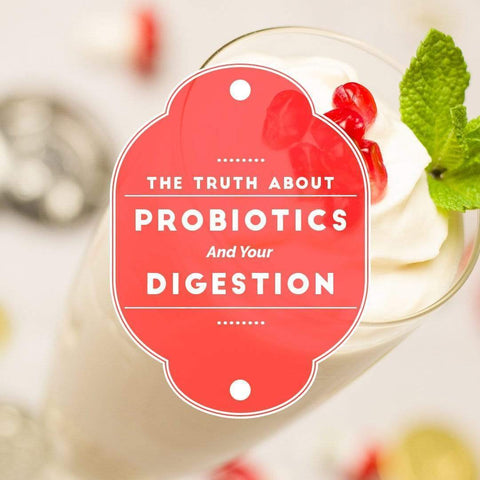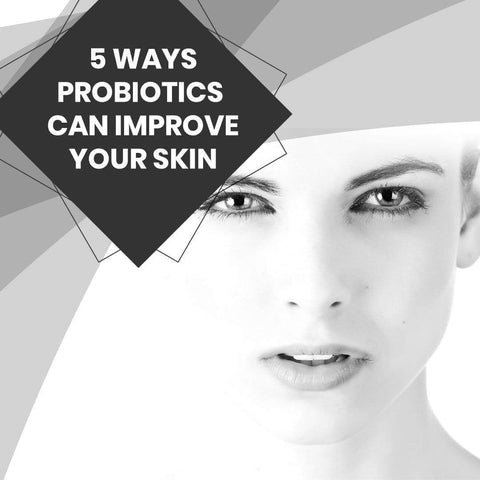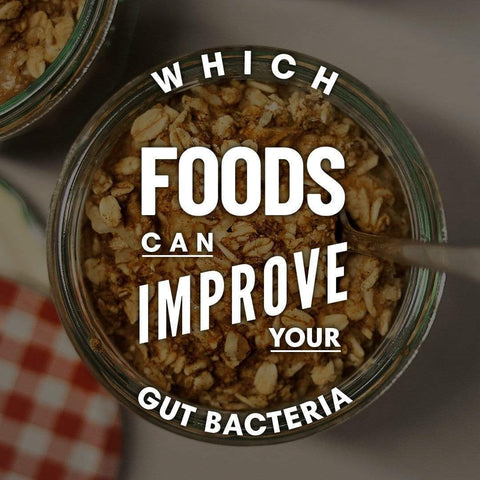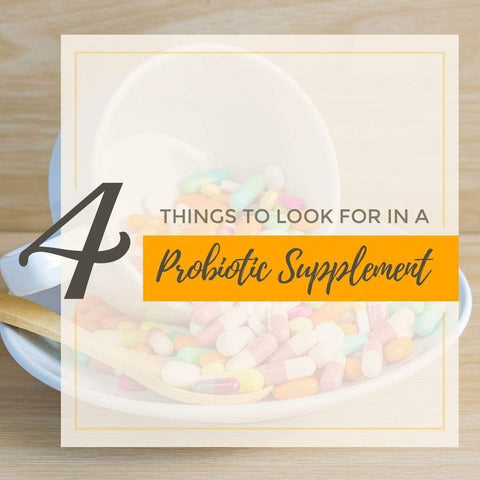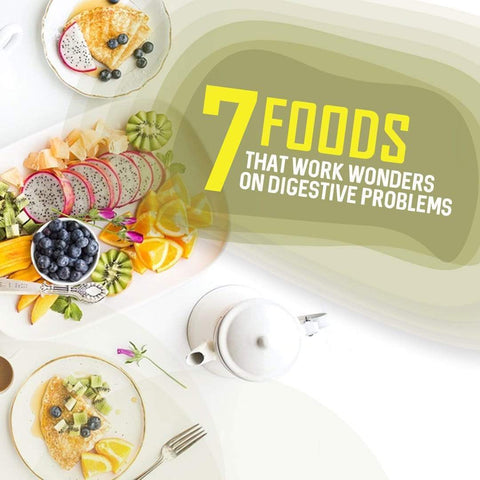
Probiotics (good bacteria) affect nearly every part of your body. And they affect the health of all those parts.
Probiotics play many crucial roles in the body. They digest food, synthesize nutrients that you need, boost your immune system, regulate inflammation throughout your body, and even make neurotransmitters.
It’s important for your health that you have plentiful probiotics in your gut. If you don’t have enough of these critters, your body will suffer in a variety of ways. The list below shows possible signs that you don’t have enough probiotics.
11 Signs You Need Probiotics
1. You have used antibiotics in the past.

Antibiotics kill off the good bacteria in your gut. The clue is in the name after all – antibiotic or anti life (bios is Greek for life).
Research is clear. When antibiotics are prescribed to patients, doctors should also prescribe probiotics [1]. When you kill off good bacteria in the gut, it can have many side effects on the patient, diarrhea being one of the most common [1]. And the vast array of potential side effects from antibiotics show just how important probiotics are to your body. When you kill off the good guys, bad things start to happen.
If your probiotics have been killed off, they need to be replenished somehow. Eating high-fiber foods is helpful for regrowth, but taking probiotics can inhibit the growth of pathogenic organisms that take the place of good bacteria 2.
2. You get sick often†.
Your gut bacteria plays a huge role in immunity.
An enormous number of immune cells are in your gut. So much so that 70% of your immune system resides in your gut 3! Scientists say that probiotics “regulate the functions” of immune cells in the intestines and throughout the body†5.
An enormous number of immune cells are in your gut. So much so that 70% of your immune system resides in your gut 3! Scientists say that probiotics “regulate the functions” of immune cells in the intestines and throughout the body†5. Probiotics can influence the behavior of immune cells by regulating inflammation and keeping the precise balance between under and overreactions 5.
Research has indeed shown that supplementation with probiotics can pump up your immune system’s effectiveness† 4.
Exclusive Bonus! Download the FREE report ‘32 Top Ways To Boost Digestive Health’ by clicking here.
3. You are depressed†.

The bugs in your gut can hugely affect your mood.
A scientific review of the evidence on the effect of probiotics on depression found that “probiotics were associated with a significant reduction in depression”† 6.
Researchers have evidenced a plethora of ways in which probiotics might improve mood†. Probiotics can affect the metabolization and synthesis of feel-good neurotransmitters, minimize stress neurotransmitters, and increase the growth of neurons (which can improve mood) 7.
4. You have digestive issue.
Bloating and excess flatulence is thought to be caused, in most cases, by overgrowth of hydrogen or methane-producing pathogens in the small intestine. It’s thought that if you don’t have a healthy amount of good bacteria in your gut, you have a higher chance of building up bad bacteria or other organisms.
Supplementation with probiotics has been shown to reduce a host of symptoms digestive issues such as gas, bloating, abdominal discomfort, and pain† 8. Although the “exact mechanisms” for the effectiveness of probiotics are unknown, the good bacteria could be fighting inflammation and improving bowel movements†9.
4. You are fat.
Amazingly, probiotics have been shown to reduce body weight 10. Researchers have detailed lots of ways in which probiotics might affect body weight. Basically, probiotics have the ability to change the rate of your metabolism and even lower your appetite 11.
5. You are hyperactive
Probiotics have effects on the nervous system, and supplementation has been shown to help calm you down 12.
Some researchers think that probiotics change the regulation of the immune system and that this is why they appear to be helpful 14. If you have too much inflammation in your body (generated by your immune cells), then your brain function can be impaired.
6. You get migraines†.

Experts say that “alterations in the microbiota † [your gut bacteria] have been linked to the occurrence of migraine” 15.
When you get migraines, the blood vessels in your brain are not working right. If they get too dilated, they can press on nerves and result in terrible pain.
Probiotics are thought to stop the messengers – inflammatory molecules and blood vascular-constricting molecules – that cause migraines† 15.
Also, the overgrowth of bad bacteria is associated with migraines, and probiotics fight this unwanted colonization 15.
7. You have allergies†.
By now, you’ve probably noticed the pattern of information showing that probiotics affect inflammation and the immune system.
Probiotics play a critical role in regulating the immune responses of your body to things you consume or breathe. “...[P]robiotics may enhance both inflammation and immune defence of the gut,” researchers say 16.
In short, probiotics are critical for a properly functioning immune system that doesn’t overreact to non-threatening things (as seen in the case of allergies) 16. Indeed, children who have healthier levels of probiotics in their guts have fewer allergies† 16.
8. You get urinary tract infections†.
As we know, probiotics help stop the colonization of bad bacteria. Research has shown that a lactobacilli strain of probiotic has been effective in preventing urinary tract infections† 17. It’s not just your gut that can be improved by probiotic supplementation!
9. You were raised on formula instead of breastmilk.

Breastmilk transfers healthy bacteria from the mother to her offspring. Without this transfer, your gut bacteria could be out of balance for much of your life.
10. You have heart disease†.
Well, if you have heart disease, it’s comforting to know that in many cases plaque in your arteries can be reversed†.
If you do have plaque buildup, imbalance of bacteria in your gut could have played a role 18.The role of probiotics in heart disease comes down, largely, to inflammation. Inflammation is a risk factor for the buildup of plaque and without the presence of enough probiotics in the gut, the gut becomes “leaky” and leaks food particles and bacteria into the bloodstream, leading to an inflammatory reaction 18.
11. You eat a western diet.
Is your diet made up mostly of meat and processed carbohydrates like bread or white rice? You could have an unhealthy gut microbiome because of this.
A diet that lacks fiber does not adequately feed the good bacteria in your gut. Humans are supposed to eat a very high fiber diet made up mostly of whole plant foods like vegetables, fruits, nuts, seeds, and whole grains. Without these healthy foods, you are not setting your gut up for success.
Do you want a probiotic supplement that actually works?
If you’re suffering from low immunity, diarrhea, fatigue, gas or bloating - you don’t have to suffer in silence any longer.
Probiotics could be the answer.

Probiotics are healthy bacteria naturally found in the gastrointestinal tract. They aid in the digestion of food and keep bad bacteria and fungi from multiplying, creating excess gases and taking over. In short, they help preserve the natural health of your GI tract.
The problem is most of us simply don’t get enough probiotics from our diets. Plus, many probiotic supplements are low dose and/or the bacteria are killed by harsh stomach acid before getting to your gut where they are needed.
Here at Nutracraft we have developed a premium high dose probiotic called Probio-40. Each serving contains 40 billion CFU across the 4 probiotic strains mentioned above plus a prebiotic, all wrapped up in a Bio-trek capsule. This makes Probio-40 one of the highest strength, stomach acid stable, gut-loving probiotic supplements on the market.
Don’t wait another day to get the relief you deserve. With a 100% money back guarantee, you have nothing to lose.




